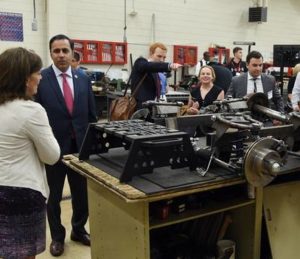Suburban educators say vocational programs need community support

Destigmatizing careers that don’t require a college degree is key to bridging a growing nationwide skills gap, say some lawmakers, educators and business leaders.
“All work has dignity,” U.S. Rep. Raja Krishnamoorthi said Monday after visiting South Elgin High School’s automotive, precision manufacturing and early childhood programs. “We cannot stigmatize any career … any pathway into the middle class.”
Krishnamoorthi, State Superintendent of Education Tony Smith and roughly 50 regional education and business leaders toured Elgin Area School District U-46’s career and technical education programs at Elgin and South Elgin high schools.
With 40 students enrolled in South Elgin’s precision manufacturing program, there is room for more students to join from throughout the district, instructor Russ Bartz said.
“We need more people to understand that it’s a good career path and it’s not a dirty job,” he said, adding manufacturing jobs are more high-tech than most people realize.
Such programs at high schools and local community colleges could benefit from increased federal funding to expand and modernize career, technical and vocational education programs.
Krishnamoorthi and U.S. Rep. Glenn Thompson of Pennsylvania were the lead Democratic and Republican sponsors of the Strengthening Career and Technical Education for the 21st Century Act. It authorizes roughly $80 million more in yearly funding over six years supporting roughly 13 million students participating in career and technical education and vocational programs at community colleges, high schools and technical campuses nationwide.
Approximately 6.6 million jobs go unfilled because employers cannot find workers with the applicable skills, while only one-third of Americans have four-year college degrees, said Krishnamoorthi, of Schaumburg, who represents the 8th Congressional District including parts of Cook, DuPage and Kane counties.
“Employers, at some point if they can’t locate the talent here, they are going to go elsewhere … to other countries,” Krishnamoorthi said. “It’s up to us … to make sure those jobs stay here. We have to come to grips with a basic fact … a vast majority of Americans are not going to get a four-year college degree.”
Funding to institutions is contingent upon educators working with local business and industry partners to design training programs for skills sought by employers. Providing high school and postsecondary students with on-the-job training in fields, such as cybersecurity, advanced manufacturing and health care also is emphasized.
“It’s so critical that students experience the workplace,” said Nancy Coleman, executive director for Alignment Collaborative for Education, which is working with U-46 on building those community partnerships. She said businesses increasingly want to collaborate with schools because they see the value of investing in their future workforce.
“Right now we are focusing on manufacturing, health care, financial services and IT (information technology),” she said.
Getting parents to understand and value career and technical programs as valid alternatives to college degrees will require engagement with communities, said Smith after visiting Elgin High School’s newly renovated $1.7 million welding lab, culinary arts, automotive and health care services programs. “This is a deep investment in all kids having access,” he said.
Author: Madhu Krishnamurthy
Photo Credit: Rick West, Staff Photographer
